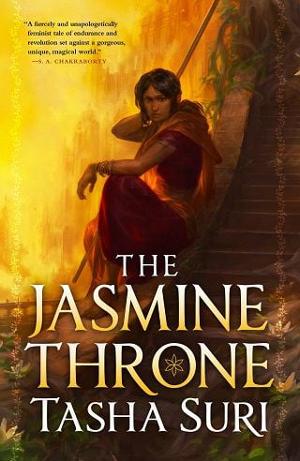Chapter 61: Rao
RAO
More than a dozen men saw it when the messenger—not one of Prem’s, but a Saketan in deep green, his braided hair half-unfurled and slick with blood—fell from his horse and collapsed at the far end of the bridge. He was already beginning to crawl his way across when the men reached him, helped him.
“Soldiers from Parijat,” the messenger gasped, once he was on monastery soil. “They’re—they’re coming. One battalion only, mothers be praised.”
“Do they know he’s here?” Narayan asked urgently.
“I don’t know,” the messenger gasped. “I don’t know, I—ah! ” And with that gasp of pain, the soldiers and priests alike were upon him, flocking around him and lifting him up to get him to safety. One Dwarali man drew off his own sash, holding it to a wound in the messenger’s side.
Rao’s mind raced. Had one of Santosh’s men managed to escape their encounter? Or had a contingent been left behind in Hiranaprastha, to seek help if Santosh did not return? There was no way to know.
Rao saw a flicker of movement from the monastery doors. A flash of blue, as a watcher vanished into the interior.
It could have been any of the priests. But Rao knew it was Aditya.
Rao stared at the door for a long moment, a kernel of bitterness and regret blooming in his stomach.
Aditya had listened. And then he had run.
Once, Rao had admired Aditya’s stillness.
The man had never been rash or quick to anger. He had been scolded for his slow reflexes when they practiced with sabers, but the sages and the military leaders who had educated him in the rules of honorable warfare, in ancient and modern military strategy, had admired his careful consideration of all factors. Aditya was a thinker. Aditya had always been a thinker.
Aditya had always wanted to do what was right.
He had spent hours poring over texts, weighing up military strategies and gambits, mulling over the ethics of warfare, puzzling out the best choices, the stratagems that would provide the perfect balance: low cost to human life, a swift victory, an honorable battle.
He rarely found that he could achieve them all.
“It will not be this easy in the real world,” Aditya had once said as they played catur, eyes fixed upon the board. His hand kept moving, hovering first over the little carved elephant, the charioteer, the infantryman, the minister. The king. “Here I can choose to sacrifice whoever I must to win.” His voice, his expression—both were oddly subdued. “In our lessons, we’re taught that we must. But sometimes I think, if there were no war at all—that would be easier.”
“It would be,” Rao had agreed, mystified. “But war happens.”
“Does it have to?”
“I don’t know,” Rao had said. “I think it’s just the way the world is.”
Aditya had frowned. Stared at the board. Then he had picked up the piece that symbolized the king and placed it beyond the board, on the edge of the table.
“There,” he said, smiling back at Rao. “Now the king can contemplate the distant horizon. Much more fun than war, I think.”
“Pretty sure that’s against the rules,” Rao had teased.
“That’s all right,” Aditya had replied. “I don’t care for catur anyway.”
And Rao had laughed, and clapped him on the back, and said, “If you’re that tired, then come and have a drink with me instead.”
He’d believed, then, that there would be time for Aditya to grow into a good emperor.
He should have known, as a devotee of the nameless, that the king standing beyond the edge of the board had meant something. That a man can sometimes see his true fate unwittingly.
“A prophetic name is not always something whispered by a priest at a child’s birth,” a priest of the nameless had said, when Rao had asked why he had to be burdened with such a name, why him. “Even beyond our faith, there are people who discover their fates by chance. Their fate finds them—in dreams, in stories, in happenstance. Often they do not recognize truth when it graces them, and the knowledge of the prophecy passes them by. But your fate would have found you, young prince, whether you had been Aloran or no. Be glad that your faith leaves you forewarned of what is to come.”
“It must be strange,” Rao had murmured. “Not to know your fate, even when you see it.”
“Perhaps,” the priest had said, smiling benevolently. “But you are of the faith of the nameless, prince of Alor. You will recognize exactly such a prophecy when you see one. You may save another man from walking his path in ignorance one day.”
Rao had not.
Rao found Aditya in a small garden replete with songbirds. Aditya did not turn, so Rao turned him, making the man meet his eyes.
“Your brother is coming for you,” Rao said raggedly, his hands on Aditya’s shoulders. “My prince, my emperor—my friend. Chandra has sent his men here. He will kill you. We need to flee.”
“Just a little longer,” Aditya murmured, looking away from Rao, out at the birds, the sky. Rao wondered what factors he was weighing up in that skull of his: how justice measured against ethics and against strategy, amounting to nothing but the stillness of his body, his distant eyes. “Just a little longer, and I will know what needs to be done.”
“There is no more time! There has never been time.”
Aditya closed his eyes. He looked like a terrible weight lay upon him—a crushing weight that bowed his shoulders as no court politics, no war, no thing they had experienced together as princes in Parijat ever had.
“You don’t understand,” Aditya whispered.
“I do. I do. I’ve kept to the tenets of this faith my whole life, Aditya. My sister died for it. But I can’t allow you to do this.”
Aditya met his eyes, finally. Dark eyes. Severe brows.
“If I am your emperor, you must give me the time I require. My word is, after all, law.” His voice was sudden iron. “And if I am not your emperor, then go and fight your war without me. It’s simple enough.”
Rao thought of that long-ago catur board; of Aditya’s frown, of the desire to step off the board. But there was no leaving this game. Aditya was a piece that had to move, if anything was to be won or lost.
“No,” Rao said firmly. “I won’t make this choice for you. This is your task, Aditya. Not mine. If you’re to be emperor, if you’re to lead us—you have to take the first step. You have to decide. I won’t choose for you.”
Aditya slipped from his grasp. Turned and walked away. And Rao bowed his head, thinking of his sister, who had burned, and the terrible weight of his own name. The hope of it.
The reality of Aditya, bound by a vision. Unwilling to rise.
 Fullepub
Fullepub 



